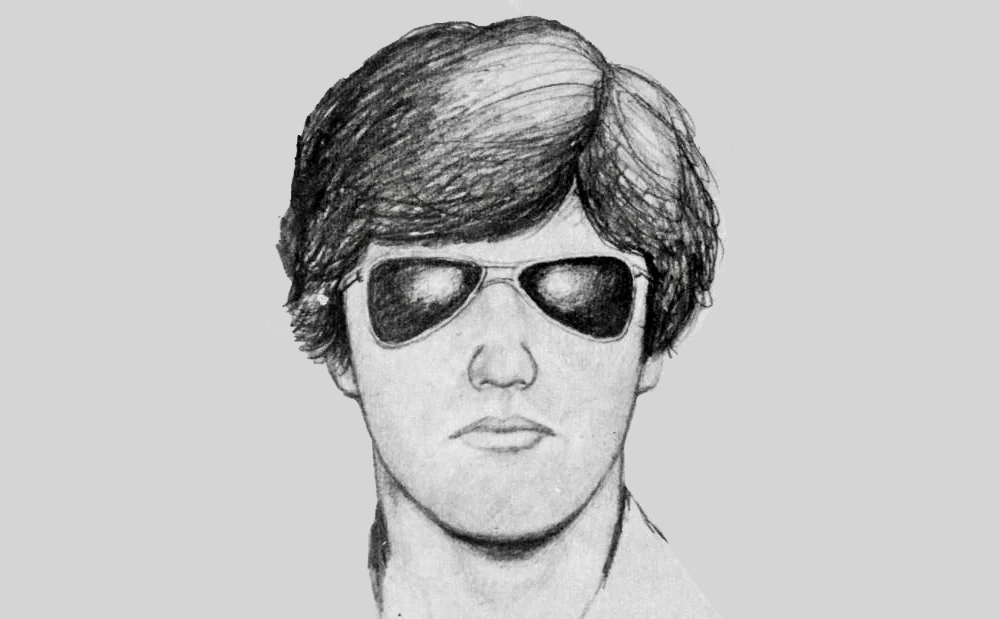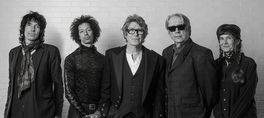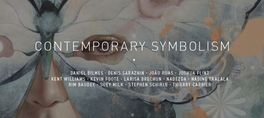"Play on, there's no such thing as better days," Damien Jurado sings on "Roger," the sweeping wash of a song that opens Reggae Film Star, his 18th full length album and second release from Jurado's own Maraqopa Records label. But as he enters his 25th year as a recording artist, it's clear these are, at the least, very good days for Jurado on the creative front. In these 12 songs, which evoke half-recalled dreams and overheard conversations, the cosmic rushes headlong into the autobiographical and specific moments on the clock fade from past to future to scenes set only in the eternal now.
Playing out like a backlot documentary filmed on the location of an unnamed TV or film set--maybe a sitcom taping, or perhaps it's a low budget science fiction B-movie, or could it be a talk show?--the album is populated by performers awaiting call times, camera operators praying for their shot, and studio audiences rapt with anticipation. The stars here eschew glitz and glamor. Instead, they wander grocery stores and parking lots in the verdant Pacific Northwest and the desert Southwest, looking for payphones and a sense of purpose.
Produced by Jurado with multi-instrumentalist Josh Gordon and recording engineer Alex Bush at Sonikwire studio in Irvine,CA, Jurado's home away from home and musical headquarters, the record's compositions are among the most musically rich in his vast discography, encompassing romantic AM gold, '60s psychedelia, driving rock & roll, Latin shuffles, and left of the dial ambiance. Strings swell, melodic bass bubbles, and piano sparkles, undergirding Jurado's unmistakable voice, at once intimately present and ghostly, grounded in the here and now but capable, at any moment, of drifting off into the divinatory. Following threads established by 2021's The Monster Who Hated Pennsylvania, the album sees Jurado embracing his auteur era, penning vignettes that arrive with little fanfare and depart quicker than you might suspect, only to linger long after they wrap.
Seeking a skeleton key to decipher the action is beside the point--Jurado's songs are worlds meant to be lived in, not picked apart--but on the beatific single "What Happened To The Class Of '65?" the singer imagines himself as both the viewer and the viewed, the eye behind the camera and its subject. This emotional and spiritual transference animates Reggae Film Star. Like a masterful director, Jurado offers motivation to the listener, staring unblinkingly from the mise-en-scène in your mind. "Look into the camera," he commands on "The Day Of The Robot," "One more time with anger/And sadness/I believe you."
A quarter-century in, Jurado remains gripped by his visions and driven by an unmatched creative drive. Reggae Film Star is one of Damien Jurado's finest works to date, a stunning new feature from one of indie rock's most cinematic figures. Here on this sound stage, you are the camera, you are the scene, you are the setting, and you are the viewer. Please try not to blink.
-Jason P. Woodbury
~~~~~~~~
Spend any amount of time with Damien Jurado and he's going to talk with you about movies. Speaking about the films that influenced his 14th album, the solitary masterwork In the Shape of a Storm, Jurado tosses out a list of favorites--American Graffiti, Paris, Texas, The Last Picture Show--films in which settings serve as silent, omniscient characters. But inquire about the curious way he writes songs, the hazy manner by which he seems to channel them from beyond the beyond, and the cinematic reference point he reaches for is a surprising one. "You ever see that movie Ghost? Whoopi Goldberg's character, Oda Mae Brown--that's who I am. These spirits are showing up at her door, jumping into her body. That's how I feel. I don't know what's coming out of me...I just show up and deliver it."
For more than two decades, Jurado has sung folk songs brimming with prophetic imagination. Whether singing ballads about killers, wounded lovers, UFO cults, or yes, the phantoms of departed friends, he's populated his work with eerie foretelling, the sense that he's divining something just on the verge of happening. He wrote his last record, 2018's The Horizon Just Laughed as a goodbye letter to his home of Seattle, Washington, before he'd even decided to leave there for sunny Los Angeles. And while he recorded the ten songs featured on In the Shape of a Storm months before the passing of his longtime collaborator and close friend Richard Swift, it's no coincidence that Swift's death looms over the album. "His absence is very much felt on this record," Jurado says.
Damien has always worked fast, but In the Shape of a Storm came together with unprecedented speed. Recorded over the course of two hours one California afternoon, it's Jurado's sparsest album to date. Gone are the thundering drums and psychedelic arrangements that defined the trilogy of concept albums he made with Swift. Gone even is the atmospheric air that hovered above his early albums for Sub Pop. Here, there's only Jurado's voice, acoustic guitar, and occasional accompaniment from Josh Gordon, playing a high-strung guitar tuned Nashville style, rendering its sound spooky and celestial. Though fans have long requested a solo acoustic album, the prospect never made sense to Jurado, until one day it simply did. "It just felt like it was time," Jurado says. The idea of an unadorned album became its own medium in his mind, like a painter who sets down his brushes and instead opts for charcoal pencils instead.
"There is nothing left to hide," Jurado sings on "Lincoln," which opens the record. It's something of a thesis statement for these songs. Everything here is clear and laid bare, two-tone, like the drawing Jurado crafted for the record's cover. Originally written for 2000's The Ghost of David, "Lincoln" was shelved and forgotten about until Damien came across it on an old cassette tape. The discovery inspired him to go about gathering up songs that had never found proper homes. As a result, In the Shape of a Storm is like an archive of previously abandoned songs. And yet, despite their disparate nature, Jurado's visions hang together in curiously symmetrical ways: the moon shines in both the echo-drenched "Silver Ball" and closer "Hands on the Table"; rain ties the title song to the lilting "Oh Weather." Jurado repeatedly returns to oceanic poetry--waves, tides, and shores--and to the theme of anchors, the metaphorical ones we use to tether ourselves to the sea floor and to each other. These are songs about the enormity of the unknown -- the shape of storms that threaten to swallow us whole-- and above all, they are songs about the connections that keep us from drifting away. "We are not meant to be on our own," Jurado sings on "Throw Me Now Your Arms."
Damien Jurado's discography is filled with songs written as miniature movies, cinematic vignettes that capture people, the places they are from, and where they are going. In the Shape of a Storm is his first black and white picture. It's both a snapshot of two hours in a California recording studio and a document spanning 19 years and a life of music. It is the sound of a singer pouring out possible futures and visions. "I believe songs have their own time and place," Jurado says. For these ten, that time has finally come.
show less
Playing out like a backlot documentary filmed on the location of an unnamed TV or film set--maybe a sitcom taping, or perhaps it's a low budget science fiction B-movie, or could it be a talk show?--the album is populated by performers awaiting call times, camera operators praying for their shot, and studio audiences rapt with anticipation. The stars here eschew glitz and glamor. Instead, they wander grocery stores and parking lots in the verdant Pacific Northwest and the desert Southwest, looking for payphones and a sense of purpose.
Produced by Jurado with multi-instrumentalist Josh Gordon and recording engineer Alex Bush at Sonikwire studio in Irvine,CA, Jurado's home away from home and musical headquarters, the record's compositions are among the most musically rich in his vast discography, encompassing romantic AM gold, '60s psychedelia, driving rock & roll, Latin shuffles, and left of the dial ambiance. Strings swell, melodic bass bubbles, and piano sparkles, undergirding Jurado's unmistakable voice, at once intimately present and ghostly, grounded in the here and now but capable, at any moment, of drifting off into the divinatory. Following threads established by 2021's The Monster Who Hated Pennsylvania, the album sees Jurado embracing his auteur era, penning vignettes that arrive with little fanfare and depart quicker than you might suspect, only to linger long after they wrap.
Seeking a skeleton key to decipher the action is beside the point--Jurado's songs are worlds meant to be lived in, not picked apart--but on the beatific single "What Happened To The Class Of '65?" the singer imagines himself as both the viewer and the viewed, the eye behind the camera and its subject. This emotional and spiritual transference animates Reggae Film Star. Like a masterful director, Jurado offers motivation to the listener, staring unblinkingly from the mise-en-scène in your mind. "Look into the camera," he commands on "The Day Of The Robot," "One more time with anger/And sadness/I believe you."
A quarter-century in, Jurado remains gripped by his visions and driven by an unmatched creative drive. Reggae Film Star is one of Damien Jurado's finest works to date, a stunning new feature from one of indie rock's most cinematic figures. Here on this sound stage, you are the camera, you are the scene, you are the setting, and you are the viewer. Please try not to blink.
-Jason P. Woodbury
~~~~~~~~
Spend any amount of time with Damien Jurado and he's going to talk with you about movies. Speaking about the films that influenced his 14th album, the solitary masterwork In the Shape of a Storm, Jurado tosses out a list of favorites--American Graffiti, Paris, Texas, The Last Picture Show--films in which settings serve as silent, omniscient characters. But inquire about the curious way he writes songs, the hazy manner by which he seems to channel them from beyond the beyond, and the cinematic reference point he reaches for is a surprising one. "You ever see that movie Ghost? Whoopi Goldberg's character, Oda Mae Brown--that's who I am. These spirits are showing up at her door, jumping into her body. That's how I feel. I don't know what's coming out of me...I just show up and deliver it."
For more than two decades, Jurado has sung folk songs brimming with prophetic imagination. Whether singing ballads about killers, wounded lovers, UFO cults, or yes, the phantoms of departed friends, he's populated his work with eerie foretelling, the sense that he's divining something just on the verge of happening. He wrote his last record, 2018's The Horizon Just Laughed as a goodbye letter to his home of Seattle, Washington, before he'd even decided to leave there for sunny Los Angeles. And while he recorded the ten songs featured on In the Shape of a Storm months before the passing of his longtime collaborator and close friend Richard Swift, it's no coincidence that Swift's death looms over the album. "His absence is very much felt on this record," Jurado says.
Damien has always worked fast, but In the Shape of a Storm came together with unprecedented speed. Recorded over the course of two hours one California afternoon, it's Jurado's sparsest album to date. Gone are the thundering drums and psychedelic arrangements that defined the trilogy of concept albums he made with Swift. Gone even is the atmospheric air that hovered above his early albums for Sub Pop. Here, there's only Jurado's voice, acoustic guitar, and occasional accompaniment from Josh Gordon, playing a high-strung guitar tuned Nashville style, rendering its sound spooky and celestial. Though fans have long requested a solo acoustic album, the prospect never made sense to Jurado, until one day it simply did. "It just felt like it was time," Jurado says. The idea of an unadorned album became its own medium in his mind, like a painter who sets down his brushes and instead opts for charcoal pencils instead.
"There is nothing left to hide," Jurado sings on "Lincoln," which opens the record. It's something of a thesis statement for these songs. Everything here is clear and laid bare, two-tone, like the drawing Jurado crafted for the record's cover. Originally written for 2000's The Ghost of David, "Lincoln" was shelved and forgotten about until Damien came across it on an old cassette tape. The discovery inspired him to go about gathering up songs that had never found proper homes. As a result, In the Shape of a Storm is like an archive of previously abandoned songs. And yet, despite their disparate nature, Jurado's visions hang together in curiously symmetrical ways: the moon shines in both the echo-drenched "Silver Ball" and closer "Hands on the Table"; rain ties the title song to the lilting "Oh Weather." Jurado repeatedly returns to oceanic poetry--waves, tides, and shores--and to the theme of anchors, the metaphorical ones we use to tether ourselves to the sea floor and to each other. These are songs about the enormity of the unknown -- the shape of storms that threaten to swallow us whole-- and above all, they are songs about the connections that keep us from drifting away. "We are not meant to be on our own," Jurado sings on "Throw Me Now Your Arms."
Damien Jurado's discography is filled with songs written as miniature movies, cinematic vignettes that capture people, the places they are from, and where they are going. In the Shape of a Storm is his first black and white picture. It's both a snapshot of two hours in a California recording studio and a document spanning 19 years and a life of music. It is the sound of a singer pouring out possible futures and visions. "I believe songs have their own time and place," Jurado says. For these ten, that time has finally come.
"Play on, there's no such thing as better days," Damien Jurado sings on "Roger," the sweeping wash of a song that opens Reggae Film Star, his 18th full length album and second release from Jurado's own Maraqopa Records label. But as he enters his 25th year as a recording artist, it's clear these are, at the least, very good days for Jurado on the creative front. In these 12 songs, which evoke half-recalled dreams and overheard conversations, the cosmic rushes headlong into the autobiographical and specific moments on the clock fade from past to future to scenes set only in the eternal now.
Playing out like a backlot documentary filmed on the location of an unnamed TV or film set--maybe a sitcom taping, or perhaps it's a low budget science fiction B-movie, or could it be a talk show?--the album is populated by performers awaiting call times, camera operators praying for their shot, and studio audiences rapt with anticipation. The stars here eschew glitz and glamor. Instead, they wander grocery stores and parking lots in the verdant Pacific Northwest and the desert Southwest, looking for payphones and a sense of purpose.
Produced by Jurado with multi-instrumentalist Josh Gordon and recording engineer Alex Bush at Sonikwire studio in Irvine,CA, Jurado's home away from home and musical headquarters, the record's compositions are among the most musically rich in his vast discography, encompassing romantic AM gold, '60s psychedelia, driving rock & roll, Latin shuffles, and left of the dial ambiance. Strings swell, melodic bass bubbles, and piano sparkles, undergirding Jurado's unmistakable voice, at once intimately present and ghostly, grounded in the here and now but capable, at any moment, of drifting off into the divinatory. Following threads established by 2021's The Monster Who Hated Pennsylvania, the album sees Jurado embracing his auteur era, penning vignettes that arrive with little fanfare and depart quicker than you might suspect, only to linger long after they wrap.
Seeking a skeleton key to decipher the action is beside the point--Jurado's songs are worlds meant to be lived in, not picked apart--but on the beatific single "What Happened To The Class Of '65?" the singer imagines himself as both the viewer and the viewed, the eye behind the camera and its subject. This emotional and spiritual transference animates Reggae Film Star. Like a masterful director, Jurado offers motivation to the listener, staring unblinkingly from the mise-en-scène in your mind. "Look into the camera," he commands on "The Day Of The Robot," "One more time with anger/And sadness/I believe you."
A quarter-century in, Jurado remains gripped by his visions and driven by an unmatched creative drive. Reggae Film Star is one of Damien Jurado's finest works to date, a stunning new feature from one of indie rock's most cinematic figures. Here on this sound stage, you are the camera, you are the scene, you are the setting, and you are the viewer. Please try not to blink.
-Jason P. Woodbury
~~~~~~~~
Spend any amount of time with Damien Jurado and he's going to talk with you about movies. Speaking about the films that influenced his 14th album, the solitary masterwork In the Shape of a Storm, Jurado tosses out a list of favorites--American Graffiti, Paris, Texas, The Last Picture Show--films in which settings serve as silent, omniscient characters. But inquire about the curious way he writes songs, the hazy manner by which he seems to channel them from beyond the beyond, and the cinematic reference point he reaches for is a surprising one. "You ever see that movie Ghost? Whoopi Goldberg's character, Oda Mae Brown--that's who I am. These spirits are showing up at her door, jumping into her body. That's how I feel. I don't know what's coming out of me...I just show up and deliver it."
For more than two decades, Jurado has sung folk songs brimming with prophetic imagination. Whether singing ballads about killers, wounded lovers, UFO cults, or yes, the phantoms of departed friends, he's populated his work with eerie foretelling, the sense that he's divining something just on the verge of happening. He wrote his last record, 2018's The Horizon Just Laughed as a goodbye letter to his home of Seattle, Washington, before he'd even decided to leave there for sunny Los Angeles. And while he recorded the ten songs featured on In the Shape of a Storm months before the passing of his longtime collaborator and close friend Richard Swift, it's no coincidence that Swift's death looms over the album. "His absence is very much felt on this record," Jurado says.
Damien has always worked fast, but In the Shape of a Storm came together with unprecedented speed. Recorded over the course of two hours one California afternoon, it's Jurado's sparsest album to date. Gone are the thundering drums and psychedelic arrangements that defined the trilogy of concept albums he made with Swift. Gone even is the atmospheric air that hovered above his early albums for Sub Pop. Here, there's only Jurado's voice, acoustic guitar, and occasional accompaniment from Josh Gordon, playing a high-strung guitar tuned Nashville style, rendering its sound spooky and celestial. Though fans have long requested a solo acoustic album, the prospect never made sense to Jurado, until one day it simply did. "It just felt like it was time," Jurado says. The idea of an unadorned album became its own medium in his mind, like a painter who sets down his brushes and instead opts for charcoal pencils instead.
"There is nothing left to hide," Jurado sings on "Lincoln," which opens the record. It's something of a thesis statement for these songs. Everything here is clear and laid bare, two-tone, like the drawing Jurado crafted for the record's cover. Originally written for 2000's The Ghost of David, "Lincoln" was shelved and forgotten about until Damien came across it on an old cassette tape. The discovery inspired him to go about gathering up songs that had never found proper homes. As a result, In the Shape of a Storm is like an archive of previously abandoned songs. And yet, despite their disparate nature, Jurado's visions hang together in curiously symmetrical ways: the moon shines in both the echo-drenched "Silver Ball" and closer "Hands on the Table"; rain ties the title song to the lilting "Oh Weather." Jurado repeatedly returns to oceanic poetry--waves, tides, and shores--and to the theme of anchors, the metaphorical ones we use to tether ourselves to the sea floor and to each other. These are songs about the enormity of the unknown -- the shape of storms that threaten to swallow us whole-- and above all, they are songs about the connections that keep us from drifting away. "We are not meant to be on our own," Jurado sings on "Throw Me Now Your Arms."
Damien Jurado's discography is filled with songs written as miniature movies, cinematic vignettes that capture people, the places they are from, and where they are going. In the Shape of a Storm is his first black and white picture. It's both a snapshot of two hours in a California recording studio and a document spanning 19 years and a life of music. It is the sound of a singer pouring out possible futures and visions. "I believe songs have their own time and place," Jurado says. For these ten, that time has finally come.
read more
Playing out like a backlot documentary filmed on the location of an unnamed TV or film set--maybe a sitcom taping, or perhaps it's a low budget science fiction B-movie, or could it be a talk show?--the album is populated by performers awaiting call times, camera operators praying for their shot, and studio audiences rapt with anticipation. The stars here eschew glitz and glamor. Instead, they wander grocery stores and parking lots in the verdant Pacific Northwest and the desert Southwest, looking for payphones and a sense of purpose.
Produced by Jurado with multi-instrumentalist Josh Gordon and recording engineer Alex Bush at Sonikwire studio in Irvine,CA, Jurado's home away from home and musical headquarters, the record's compositions are among the most musically rich in his vast discography, encompassing romantic AM gold, '60s psychedelia, driving rock & roll, Latin shuffles, and left of the dial ambiance. Strings swell, melodic bass bubbles, and piano sparkles, undergirding Jurado's unmistakable voice, at once intimately present and ghostly, grounded in the here and now but capable, at any moment, of drifting off into the divinatory. Following threads established by 2021's The Monster Who Hated Pennsylvania, the album sees Jurado embracing his auteur era, penning vignettes that arrive with little fanfare and depart quicker than you might suspect, only to linger long after they wrap.
Seeking a skeleton key to decipher the action is beside the point--Jurado's songs are worlds meant to be lived in, not picked apart--but on the beatific single "What Happened To The Class Of '65?" the singer imagines himself as both the viewer and the viewed, the eye behind the camera and its subject. This emotional and spiritual transference animates Reggae Film Star. Like a masterful director, Jurado offers motivation to the listener, staring unblinkingly from the mise-en-scène in your mind. "Look into the camera," he commands on "The Day Of The Robot," "One more time with anger/And sadness/I believe you."
A quarter-century in, Jurado remains gripped by his visions and driven by an unmatched creative drive. Reggae Film Star is one of Damien Jurado's finest works to date, a stunning new feature from one of indie rock's most cinematic figures. Here on this sound stage, you are the camera, you are the scene, you are the setting, and you are the viewer. Please try not to blink.
-Jason P. Woodbury
~~~~~~~~
Spend any amount of time with Damien Jurado and he's going to talk with you about movies. Speaking about the films that influenced his 14th album, the solitary masterwork In the Shape of a Storm, Jurado tosses out a list of favorites--American Graffiti, Paris, Texas, The Last Picture Show--films in which settings serve as silent, omniscient characters. But inquire about the curious way he writes songs, the hazy manner by which he seems to channel them from beyond the beyond, and the cinematic reference point he reaches for is a surprising one. "You ever see that movie Ghost? Whoopi Goldberg's character, Oda Mae Brown--that's who I am. These spirits are showing up at her door, jumping into her body. That's how I feel. I don't know what's coming out of me...I just show up and deliver it."
For more than two decades, Jurado has sung folk songs brimming with prophetic imagination. Whether singing ballads about killers, wounded lovers, UFO cults, or yes, the phantoms of departed friends, he's populated his work with eerie foretelling, the sense that he's divining something just on the verge of happening. He wrote his last record, 2018's The Horizon Just Laughed as a goodbye letter to his home of Seattle, Washington, before he'd even decided to leave there for sunny Los Angeles. And while he recorded the ten songs featured on In the Shape of a Storm months before the passing of his longtime collaborator and close friend Richard Swift, it's no coincidence that Swift's death looms over the album. "His absence is very much felt on this record," Jurado says.
Damien has always worked fast, but In the Shape of a Storm came together with unprecedented speed. Recorded over the course of two hours one California afternoon, it's Jurado's sparsest album to date. Gone are the thundering drums and psychedelic arrangements that defined the trilogy of concept albums he made with Swift. Gone even is the atmospheric air that hovered above his early albums for Sub Pop. Here, there's only Jurado's voice, acoustic guitar, and occasional accompaniment from Josh Gordon, playing a high-strung guitar tuned Nashville style, rendering its sound spooky and celestial. Though fans have long requested a solo acoustic album, the prospect never made sense to Jurado, until one day it simply did. "It just felt like it was time," Jurado says. The idea of an unadorned album became its own medium in his mind, like a painter who sets down his brushes and instead opts for charcoal pencils instead.
"There is nothing left to hide," Jurado sings on "Lincoln," which opens the record. It's something of a thesis statement for these songs. Everything here is clear and laid bare, two-tone, like the drawing Jurado crafted for the record's cover. Originally written for 2000's The Ghost of David, "Lincoln" was shelved and forgotten about until Damien came across it on an old cassette tape. The discovery inspired him to go about gathering up songs that had never found proper homes. As a result, In the Shape of a Storm is like an archive of previously abandoned songs. And yet, despite their disparate nature, Jurado's visions hang together in curiously symmetrical ways: the moon shines in both the echo-drenched "Silver Ball" and closer "Hands on the Table"; rain ties the title song to the lilting "Oh Weather." Jurado repeatedly returns to oceanic poetry--waves, tides, and shores--and to the theme of anchors, the metaphorical ones we use to tether ourselves to the sea floor and to each other. These are songs about the enormity of the unknown -- the shape of storms that threaten to swallow us whole-- and above all, they are songs about the connections that keep us from drifting away. "We are not meant to be on our own," Jurado sings on "Throw Me Now Your Arms."
Damien Jurado's discography is filled with songs written as miniature movies, cinematic vignettes that capture people, the places they are from, and where they are going. In the Shape of a Storm is his first black and white picture. It's both a snapshot of two hours in a California recording studio and a document spanning 19 years and a life of music. It is the sound of a singer pouring out possible futures and visions. "I believe songs have their own time and place," Jurado says. For these ten, that time has finally come.
show less
Date/Times:
The Chapel
6 Upcoming Events
777 Valencia Street, San Francisco, CA 94110
The Best Events
Every Week in Your Inbox
From Our Sponsors
UPCOMING EVENTS
Great suggestion! We'll be in touch.
Event reviewed successfully.









